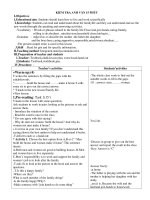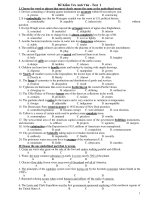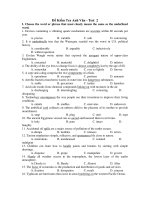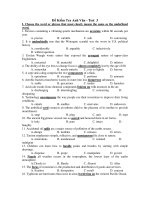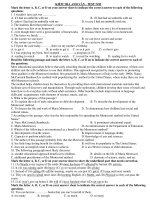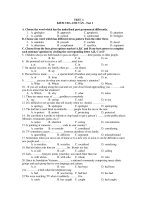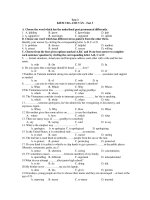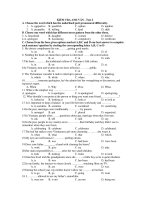KIỂM TRA ANH VĂN - Test 3 pptx
Bạn đang xem bản rút gọn của tài liệu. Xem và tải ngay bản đầy đủ của tài liệu tại đây (45.37 KB, 3 trang )
Test 3
KIỂM TRA ANH VĂN - Test 3
A. Choose the word which has the underlined part pronounced differently.
1. A. kidding B. know C. knowledge D. knit
2. A. supportive B. maximum C. argument D. submit
B. Choose one word which has different stress pattern from the other three.
Identify your answer by circling the corresponding letter A, B, C or D.
3. A. problem B. discuss C. helpful D. number.
4. A. attract B. install C. secure D. willing
C. Choose from the four given options marked A,B,C and D one best answer to complete
each sentence/ question by circling the corresponding letter A,B, C or D
5. … formal situations, Americans and Europeans address each other with a title and the last
name.
A. with B .On C. Of D. In.
6. Do you agree that a marriage should be based ………love?
A. in B. on C. at D. of
7.Families in Vietnam maintain strong ties and provide each other ……….assistance and support
as needed.
A. on B. of C. with D. in
8. …………can you do when you want to attract someone’s attention?
A. What B. Which C. Why D. Where.
9.The Vietnamese never kiss …………greeting and saying goodbye.
A. which B. where C. when D. while.
10. The Vietnamese consider it rude to interrupt a person …………he/ she is speaking.
A. which B. while C. where D. why.
11. ………… someone apologizes, he/ she admits his/ her wrongdoing or discourtesy, and
expresses regret.
A. When b. Why C. How D. What.
12. His mother gives him some advice on……….to use the telephone.
A. where b. how C. which D. what
13. There are many ways of …… goodbye to somebody
A. say B. saying C. said D. to say
14. What is the simplest way ……………………?
A. apologize b. to apologize C. to apologized D. apologizing
15. In the United States, it is considered rude ………….at someone.
A. to stare B. stare C. stared D. staring
16. The leaf hat is used liked an umbrella …… people from the sun or the rain.
A. to protect B. protect C. protecting D. protected.
17. Do you think it is polite to whistle or clap hands to get a person’s …… in the public places
(libraries, restaurants, parks, etc.)?
A. notice B. attention C. seeing D. concentration
18. TV sometimes causes …………….between members of my family.
A. quarrelling B. different C. argument D. misunderstand
19.What do you attempt ………after junior high school?
A. to do B. do C. doing D. did.
20.My brother never …………….me use his laptop.
A. does B. lets C. gives D. permits
21.Nowadays, young people are free to choose their mates and they are encouraged …at least at the
age of 23.
A. marrying B. marry C. to marry D. married.
22.He was the first man ………at the conference.
A. arrive B. to arrive C. arrives D. arriving.
23.From the time he arrived home, he ………….a lot of silly questions.
A. ask B. asks C. has asked D. asked.
24.She has three brothers, all of whom ……….in Ho Chi Minh city .
A. is working B. are working C. works D. working.
25."Why don't you ask the teacher for help?" Peter asked me.
a. Peter advised me to ask the teacher for help.
b. Peter recommended me not to ask the teacher for help. ,
c. Peter told me the reason why I did not ask the teacher for help.
d. Peter suggested that he should ask the teacher for help.
26.“What were you doing last night, Mr John?” asked the police.
A. The police asked what were you doing last night, Mr John
B. The police asked Mr John what he had been doing the night before
C. The police asked Mr John what he had been done the night before
D. The police asked Mr John what had he been done the night before
D. Choose the incorrect part indicated by A, B, C or D in the sentences.
27. Are there any differences among Vietnamese and American culture?
A B C D
28. Our family is a base from which we can go into the world with confident
A B C D
29. During the school year, I’m not allowed to watch television when I have finished my
homework
A B C D
30. I didn’t know you could speak English so good.
A B C D
E. Read the following passage then choose the correct answer
My life is always full of activities, so I never have much time for myself. During the week it’s the
worst. I usually have to get up at six though I would really prefer to sleep much later. I don’t
usually have time for breakfast because I have to catch a bus to school at half past six. The bus is
usually packed with many people. Classes at school start at seven.
Getting home at about 12, I have lunch and listen to the radio, watch TV and do my homework
then I help my mom with some housework.
My family often have dinner at about seven o’clock. At dinner we discuss what happened during
the day and catch up with each others’ lives. Then I watch the IV news
Weekends are wonderful time for me because I sleep late and do whatever I wish with my free
time, I can go for a trip with my friends, visit my relatives or devote more time to my hobbies. I
think everyone will agree with me that weekends are much better than weekdays.
31. The writer doesn’t have breakfast because……………
A. he doesn’t have time for himself. B. he has to catch the bus to school
C. he wants to sleep more. D. he gets up late
32. The word “packed” in line 4 means…………
A. stuff B. busy C. crowded D. full
33. Which of the following activities is not done by the writer in the evening?
A. watch TV B. talk to others. C. have dinner D. listen to
music
34. The word “ devote’ in paragraph 4 is closest in meaning to …………
A. spend. B. begin C. get D. take
35. Which of the following is not true according to the passage?
A. The writer usually sleeps late on weekdays. B. Weekdays are worse than
weekends
C. The writer can sleep late on weekends. D. Weekends are better than
weekdays.
F. Read the following passage and choose the best given answer A,B,C or D to fill in each
gap.
In the afternoon, after hospital, my mother rushes ……36….the market, then hurries home so
that dinner is ready on the table by the time Dad …37……home. Dad is always willing …38… a
hand with cleaning the house. Unlike most men, he enjoys cooking. Sometimes,
…39… weekends, he cooks us some special dishes. His eel soup is the best soup I have
ever……40……
36. A. to B. in C. at D. on
37. A. will get B. gets C. got D. to get
38. A. give B. to give C. giving D. given
39. A. on B. at C. in D. with
40. A. eater B. ate C. eaten D. been eating

